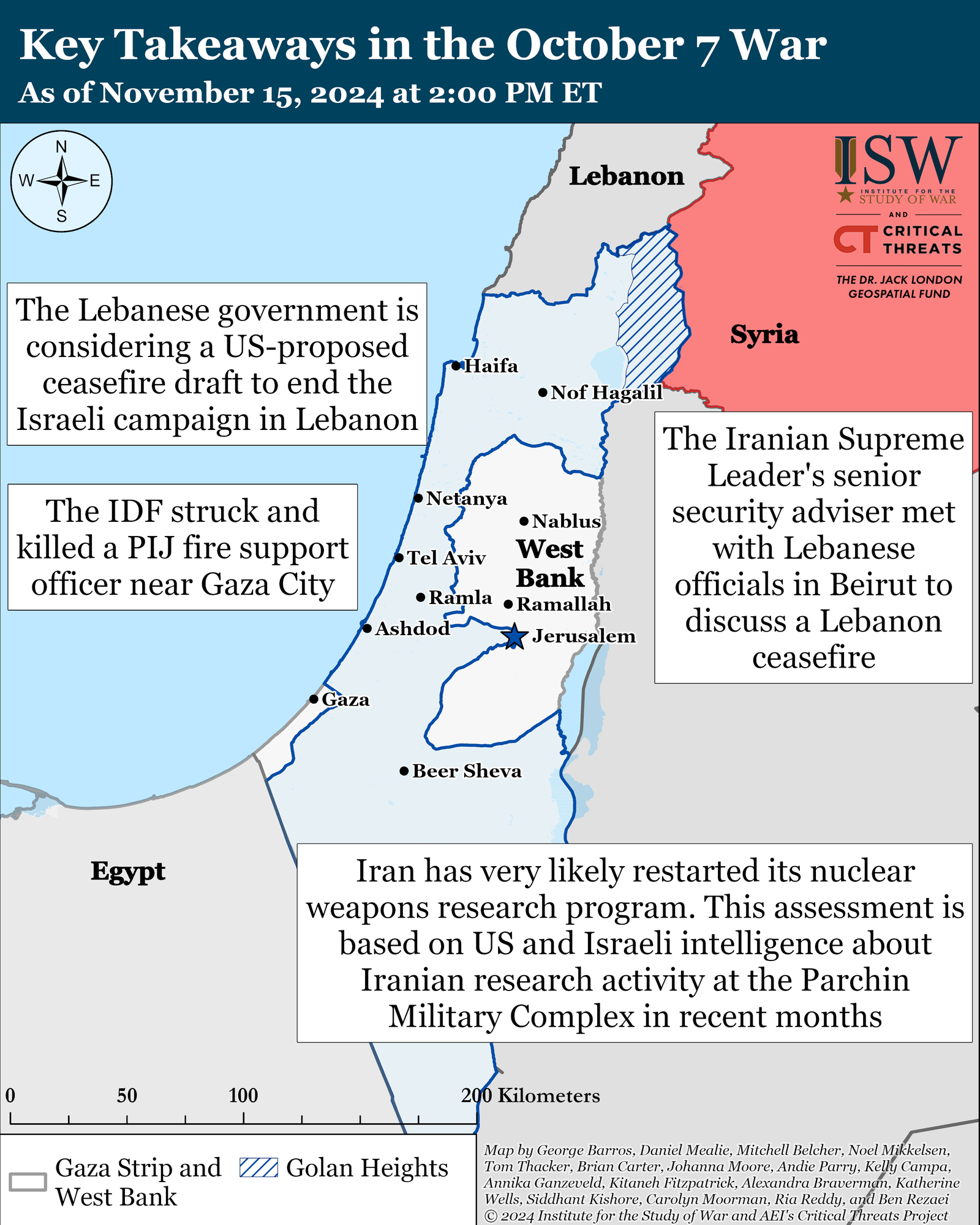3 hours ago
Information Cutoff: 2:00 pm ET
The Critical Threats Project (CTP) at the American Enterprise Institute and the Institute for the Study of War (ISW) publish the Iran Update, which provides insights into Iranian and Iranian-sponsored activities that undermine regional stability and threaten US forces and interests. Click here to see CTP and ISW’s interactive map of Israeli ground operations. This map is updated daily alongside the static maps present in this report.
We do not report in detail on war crimes because these activities are well-covered in Western media and do not directly affect the military operations we are assessing and forecasting. We utterly condemn violations of the laws of armed conflict and the Geneva Conventions and crimes against humanity even though we do not describe them in these reports.
Iran has very likely restarted its nuclear weapons research program in the past year. This assessment is based on publicly reported US and Israeli intelligence about Iranian research activity at the Parchin Military Complex outside Tehran in recent months.[i] Unspecified US and Israeli officials told Axios on November 15 that the Israel Defense Forces (IDF) strikes into Iran on October 25 destroyed an active, top-secret nuclear weapons research facility—Taleghan 2—at the Parchin Military Complex.[ii] The Iranian regime previously used the Taleghan 2 facility to test explosives that are needed to detonate a nuclear device before the regime suspended its nuclear weapons program in 2003.[iii] International inspectors found traces of uranium at the Parchin Military Complex in 2015, indicating that a larger quantity of uranium was there at some point, despite Iranian officials denying that the complex was involved in nuclear activities.[iv] Unspecified Israeli officials told Axios that the IDF destroyed “sophisticated equipment” dating back to before 2003 that is “needed to design and test plastic explosives that surround uranium in a nuclear device and are needed to detonate it.”[v] The officials added that due to the Israeli strike on October 25, Iran would have to acquire new equipment if it decided to pursue a nuclear weapon. CTP-ISW does not assess that Iran has decided to build a nuclear weapon at this time.
US and Israeli intelligence began detecting suspicious research activity, including computer modeling, metallurgy, and explosive research, at the Parchin Military Complex earlier in 2024.[vi] US and Israeli intelligence services obtained intelligence in March 2024 showing that Iran was running computer models and conducting metallurgical research that could support the development of nuclear weapons.[vii] Iran dismissed a warning from the United States in July 2024 about its suspicious research activities.[viii] Each one of these activities—computer modeling, metallurgical research, and explosive research—could theoretically have a civilian application. However, when taken together, there is no plausible explanation for these research activities other than that they are meant to support Iran’s development of a nuclear arsenal.
Computer modeling could reduce the amount of time it would take Iran to conduct a successful real-world nuclear test if Iran decided to pursue a nuclear weapon. Computer modeling would enable Iran to simulate a nuclear test before conducting a real-life test. Iran—if it decided to do so—could then build multiple nuclear weapons before a real-life test revealed that Iran had achieved weaponization. Building multiple nuclear weapons would allow Iran to test one weapon while still possessing multiple operational weapons to deter adversaries, which is consistent with CTP-ISW’s long-standing assessment that Iran has developed a nuclear program that it intends to use to produce a nuclear arsenal. Iran possessed 164.7 kilograms of highly enriched uranium (uranium enriched up to 60 percent) as of August 2024, which is equivalent to 3.95 significant quantities.[ix] The IAEA defines a significant quantity as the “approximate amount of nuclear material for which the possibility of manufacturing a nuclear explosive device cannot be excluded.”[x]
According to Axios, The IDF targeted the Taleghan 2 facility because it is not part of Iran’s declared nuclear program and Iran could therefore not acknowledge the significance of the IDF strikes on the site without admitting that it had violated the Treaty on the Non-Proliferation of Nuclear Weapons.[xi] The IDF’s strike also avoided targeting a nuclear facility that the IAEA was actively monitoring by hitting an undeclared site.
International Atomic Energy Agency (IAEA) Director General Rafael Grossi visited the Natanz nuclear plant and the Fordow enrichment site in Iran on November 15.[xii] Atomic Energy Organization of Iran Spokesperson Behrouz Kamalvandi and lead Iranian nuclear negotiator Kazem Gharib Abadi accompanied Grossi.[xiii] The IAEA reported in August 2024 that Iran had installed eight cascades of IR-6 centrifuges at Fordow and 10 out of 18 planned cascades of IR-2m centrifuges at Natanz.[xiv]
The Lebanese government is considering a US-proposed ceasefire draft to end Hezbollah’s war with Israel. Lebanese Parliament Speaker Nabih Berri confirmed to Saudi Arabia-outlet Asharq al Awsat that he received a proposal from the United States on November 15.[xv] Reuters first reported that the Lebanese government received the proposal on November 14, citing two senior Lebanese political sources.[xvi] CTP-ISW cannot independently verify the terms under negotiation. Israeli public broadcaster Kan published the same draft that it originally leaked on October 30 in its discussion of the proposal.[xvii] It remains unclear if Kan’s reporting reflects the current draft under consideration. Kan’s text requires Israel to withdraw its forces from southern Lebanon within seven days and stipulates that the Lebanese army would backfill IDF positions.[xviii] The supposed draft agreement gives Lebanon and Israel the right to self-defense if necessary and requires Hezbollah to withdraw from southern Lebanon in order to make the Lebanese Armed Forces and the United Nations Interim Force in Lebanon the only armed forces in the south.[xix] Kan’s report would also have Lebanon commit to disarm all unofficial military groups within sixty days of signing the ceasefire.[xx] The Lebanese army would supervise all weapons transport into Lebanon as well as dismantle all unauthorized weapons production facilities and unofficial military infrastructure.[xxi]
Parliament Speaker Berri expressed reservations about the current proposal. He denied that the proposal allows freedom of movement in Lebanon for the IDF.[xxii] Berri also said that the text contains terms unacceptable to Lebanon, including creating a new mechanism involving Western countries to oversee the implementation of UNSCR 1701.[xxiii] Hezbollah Secretary General Naim Qassem recently said that Israel would have to end operations in Lebanon before Hezbollah would agree to indirect ceasefire talks and stated that Hezbollah would require the “full protection of Lebanese sovereignty without any reduction” in negotiations.[xxiv] Hezbollah would likely interpret Israeli freedom to operate in Lebanon or a new mechanism to ensure security in southern Lebanon as a ”reduction” of Lebanese sovereignty.
Iranian Supreme Leader Ali Khamenei’s senior security adviser Ali Larijani met with senior Lebanese officials in Beirut on November 15 to discuss a ceasefire in the Israel-Hezbollah conflict.[xxv] Larijani emphasized Iran’s support for the Lebanese government and Hezbollah during a meeting with Prime Minister Najib Mikati and Parliament Speaker Nabih Berri. Larijani‘s visit to Beirut comes as the United States continues its efforts to secure a ceasefire in Lebanon.[xxvi] Berri has served as the main mediator between the United States and Israel and Hezbollah in those talks.
The head of airport security at Rafic Hariri International Airport reportedly detained the Iranian Embassy in Beirut’s security team while it was escorting Larijani.[xxvii] The report did not specify how long airport security held the security team. A Lebanese media outlet run by a Christian businessman claimed that Lebanese Armed Forces (LAF) Brigadier General Fadi Kfoury ordered the closure of all gates leading to the VIP lounge after the Iranian Embassy’s security team, which was escorting Larijani, cited diplomatic immunity and refused to undergo ”thorough inspection.”[xxviii] Hezbollah-affiliated Lebanese outlet al Akhbar accused Kfoury of being close to the United States when Kfoury assumed his position, suggesting that Hezbollah is opposed to Kfoury’s role as head of airport security.[xxix] Kfoury’s decision to detain Larijani’s security team may indicate an increased willingness among some Lebanese government officials to challenge Hezbollah and Iran’s influence in Lebanon while the group is weakened by Israeli strikes.
Israeli forces have advanced to the town of Chama, approximately five kilometers into southwestern Lebanon, as of November 15. Geolocated footage posted on November 15 shows Israeli forces operating at the Shrine of the Prophet Shimon in Chama.[xxx] Commercially available satellite imagery captured on November 14 and 15 showed that Israeli forces have advanced from Yarine and Oum Touteh northwest through Jebbayn and Tayr Harfa. Lebanese media reported Israeli artillery shelling in Jebbayn and Tayr Harfa during this time.[xxxi] Artillery fire support is meant to ”destroy, neutralize, or suppress the enemy” to ensure freedom of maneuver for ground forces, which could suggest that Israeli forces were maneuvering near Jebbayn and Tayr Harfa between November 14 and 15.[xxxii] Hezbollah claimed two separate rocket and anti-tank fire attacks on November 15 targeting Israeli forces in western Tayr Harfa and Jebbayn, suggesting Israeli forces continue to operate in these areas.[xxxiii] Lebanese media separately claimed Hezbollah and Israeli forces engaged in small arms combat between Tayr Harfa, Jebbayn, and Chama.[xxxiv]
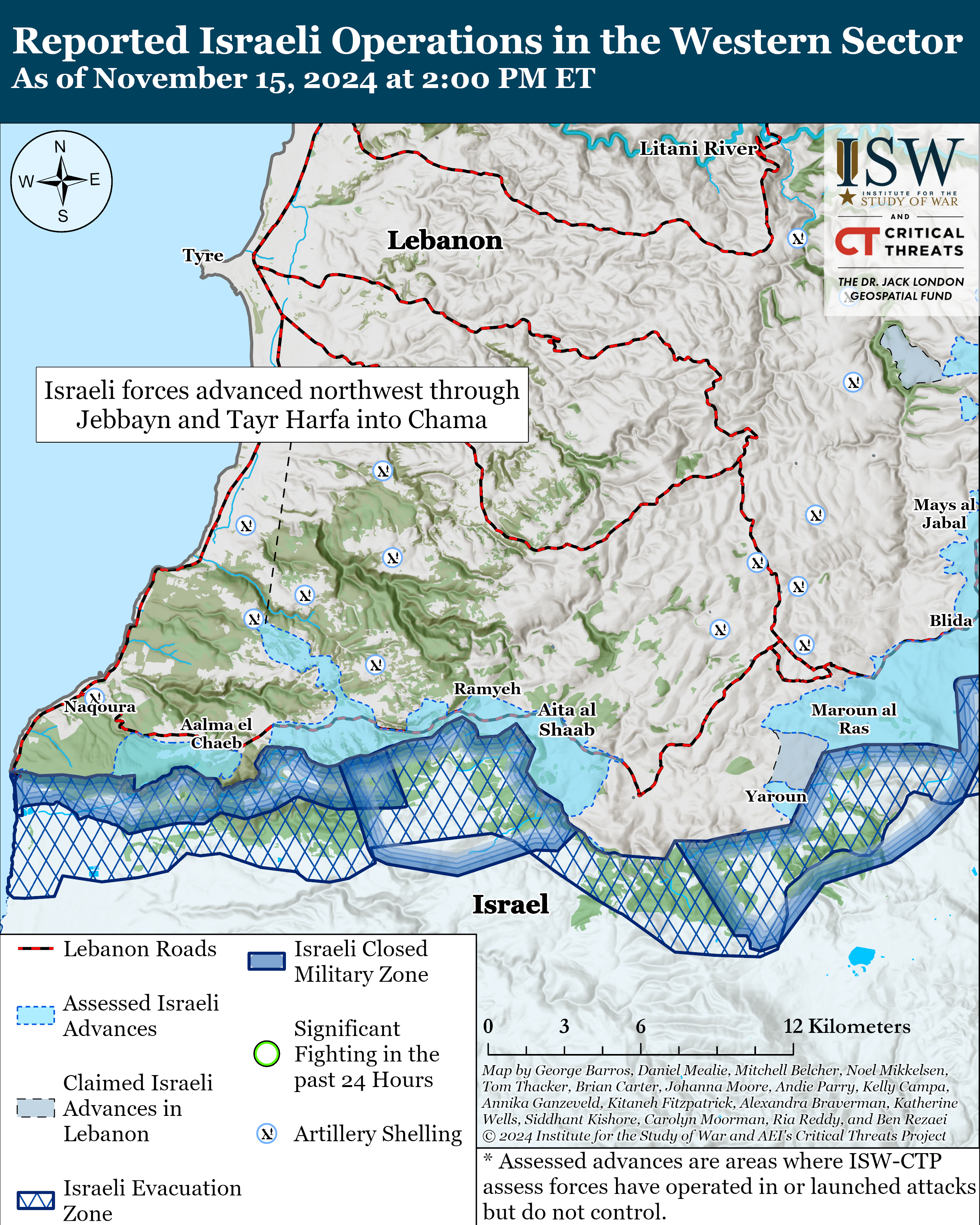
Esfahan interim Friday Prayer Leader and member of the Iranian Assembly of Experts, Seyyed Abolhasan Mahdavi, stated that the Assembly has confidentially identified and prioritized three candidates for leadership succession.[xxxv] Mahdavi asserted that this is a regular duty of the Assembly. Khamenei said on November 7 that the Assembly should select a leader who embodies the revolution and ensures its continuation to achieve the revolution’s “main goal” of “implementing the religion of Islam in the country and in people’s lives.”[xxxvi] The current Assembly, elected in March 2024, will serve until 2032 and is expected to be responsible for selecting Khamenei’s successor upon his passing.[xxxvii] Mahdavi also stated that identifying a successor within a confidential commission is not a new issue.[xxxviii]
Israeli Defense Minister Israeli Katz decided that the IDF would soon begin issuing conscription orders to Israeli ultra-Orthodox.[xxxix] Former Defense Minister Yoav Gallant decided to conscript 7,000 ultra-Orthodox before he was fired, and Katz confirmed this decision.[xl] The IDF will send conscription orders to 1,000 ultra-Orthodox beginning on November 17 and will gradually send the remaining 6,000 orders over the next six weeks.[xli] Katz’s decision comes after the Israeli Army Radio published data on November 14 showing that the IDF currently has only 83 percent of the combat manpower it requires.[xlii]
Key Takeaways:
- Iranian Nuclear Program: Iran has very likely restarted its nuclear weapons research program in the past year. This assessment is based on publicly reported US and Israeli intelligence about Iranian research activity at the Parchin Military Complex outside Tehran in recent months. US and Israeli intelligence began detecting suspicious research activity, including computer modeling, metallurgy, and explosive research, at the Parchin Military Complex earlier in 2024.
- Ceasefire in Lebanon: The Lebanese government is considering a US-proposed ceasefire draft to end Hezbollah’s war with Israel. The Lebanese parliamentary speaker expressed reservations about the current proposal.
- Senior Iranian Official in Lebanon: Iranian Supreme Leader Ali Khamenei’s senior security adviser Ali Larijani met with senior Lebanese officials in Beirut on November 15 to discuss a ceasefire in the Israel-Hezbollah conflict. The head of airport security at Rafic Hariri International Airport reportedly detained the Iranian Embassy in Beirut’s security team while it was escorting Larijani.
- Israeli Ground Operations in Lebanon: Israeli forces have advanced to the town of Chama, approximately five kilometers into southwestern Lebanon, as of November 15.
- Supreme Leader Succession: Esfahan interim Friday Prayer Leader and member of the Iranian Assembly of Experts, Seyyed Abolhasan Mahdavi, stated that the Assembly has confidentially identified and prioritized three candidates for leadership succession.
- Israel Drafts Ultra-Orthodox: Israeli Defense Minister Israeli Katz decided that the IDF will soon begin issuing conscription orders to Israeli ultra-Orthodox.
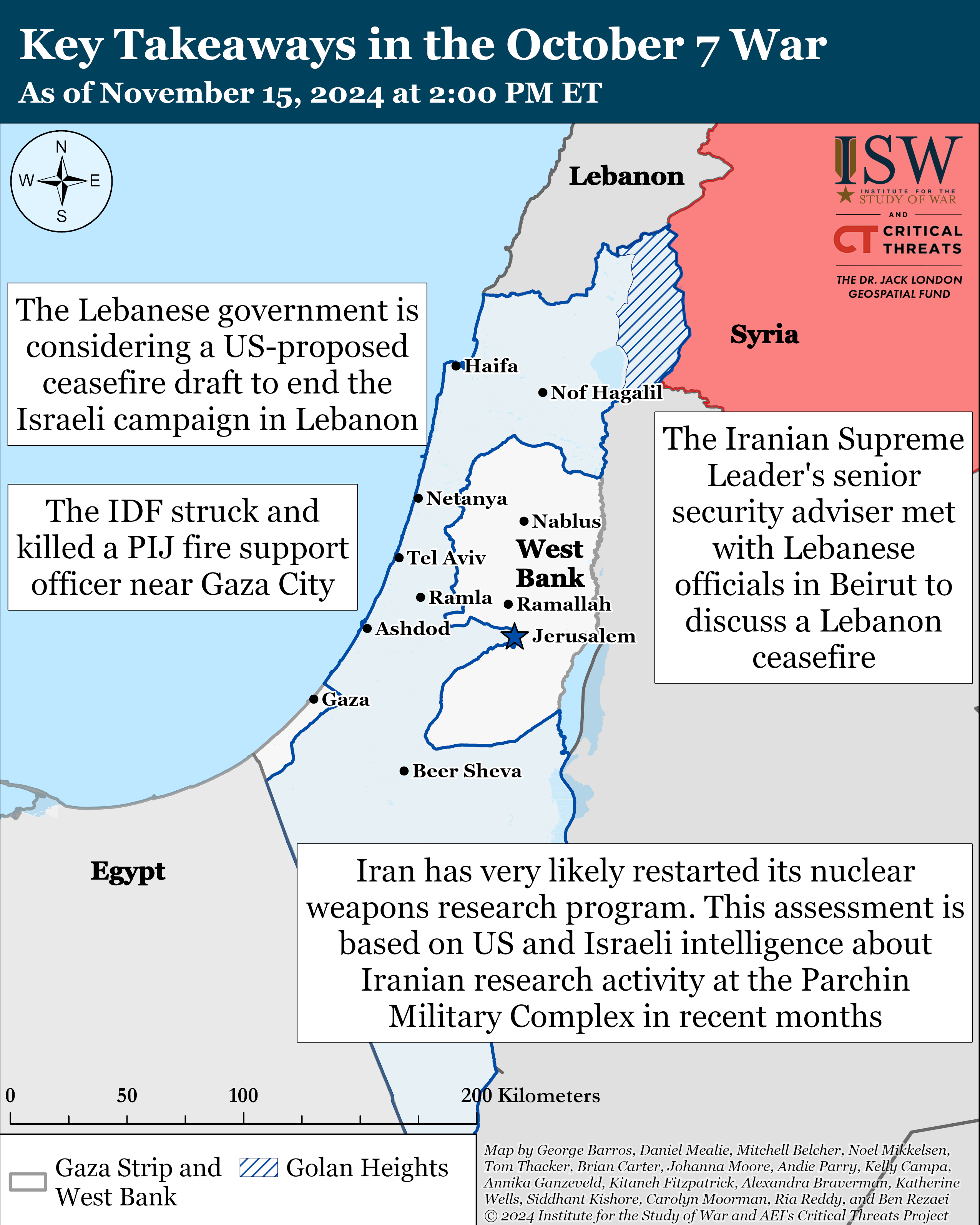
Gaza Strip:
Axis of Resistance objectives:
- Erode the will of the Israeli political establishment and public to sustain clearing operations in the Gaza Strip
- Reestablish Hamas as the governing authority in the Gaza Strip
Palestinian Islamic Jihad (PIJ) published another scripted and coerced video of Israeli hostage Alexander Turbanov to continue degrading Israeli public support for IDF operations in the Gaza Str Turbanov urged Aryeh Deri, the leader of the ultra-Orthodox Israeli Shas party, to convince the Israeli government to agree to a ceasefire-hostage deal.[xliv] PIJ is likely timing the release of these videos to exploit Israeli domestic discontent after Israeli Prime Minister Benjamin Netanyahu dismissed former Defense Minister Yoav Gallant on November 5 for Gallant’s support of a ceasefire with Hamas.[xlv]
The IDF 162nd Division continued clearing operations in Beit Lahia and Jabalia in the northern Gaza Strip on November 15.[xlvi] Israeli forces killed fighters and destroyed militia supplies, including explosives, small arms, and other military equipment. Palestinian militias, including Hamas, conducted six attacks targeting Israeli forces and armor in Beit Lahia.[xlvii] Hamas also detonated an explosively formed penetrator west of Jabalia refugee camp.[xlviii]
The IDF Air Force struck and killed PIJ fire control support officer Luqman Abd al Salam Khalil Anbar inn, Gaza City, on November 15.[xlix] Anbar managed PIJ’s rocket attacks targeting Israel and had a central role in PIJ’s munitions production process. The IDF strike also killed several other PIJ fighters.
Palestinian militias conducted three indirect fire attacks targeting Israeli forces and command-and-control sites along the Netzarim Corridor on November 15.[l]
The IDF 143rd Division continued operations in Rafah in the southern Gaza Strip on November 15. Israeli forces directed an airstrike targeting armed fighters operating near Israeli forces in Rafah.[li]
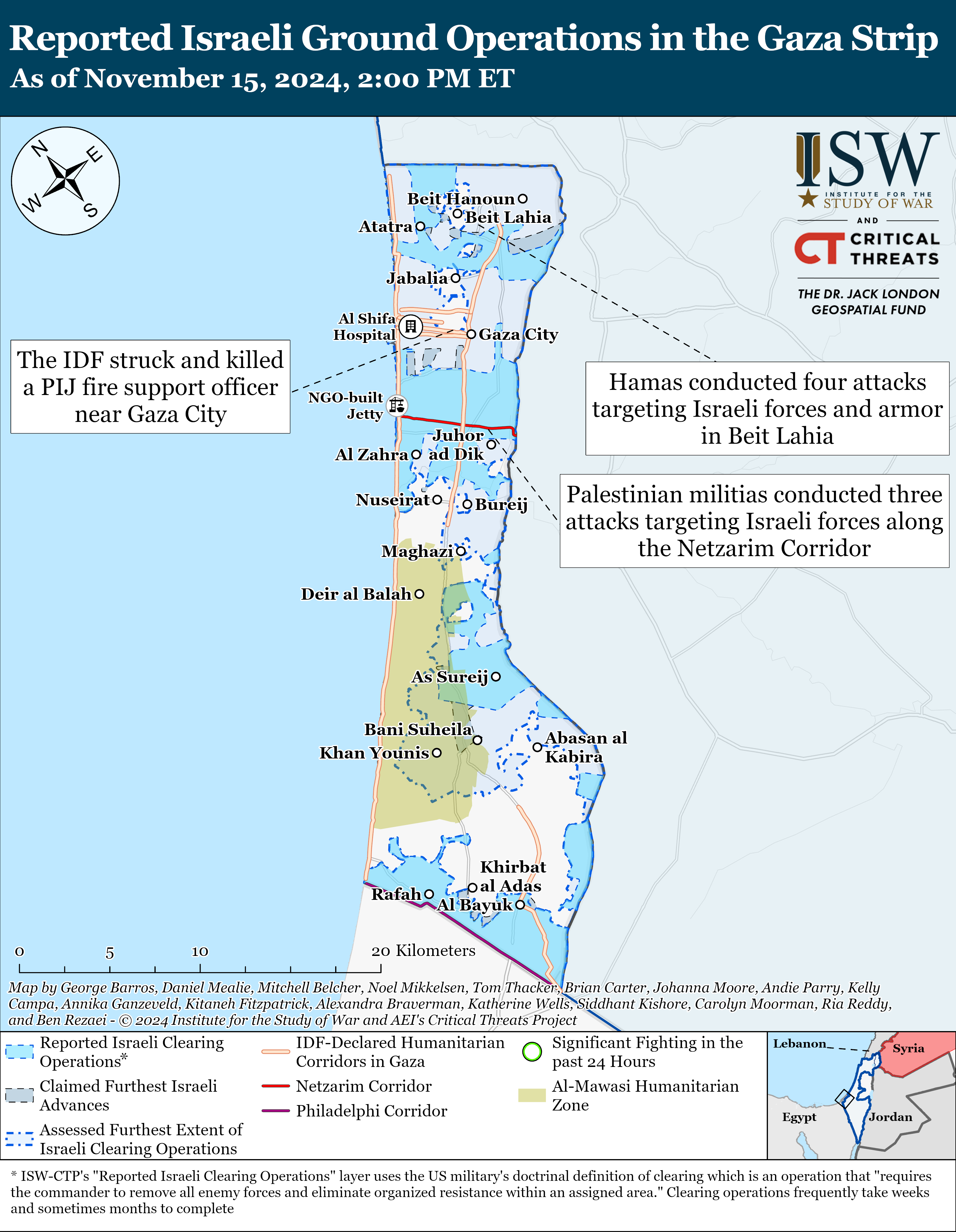
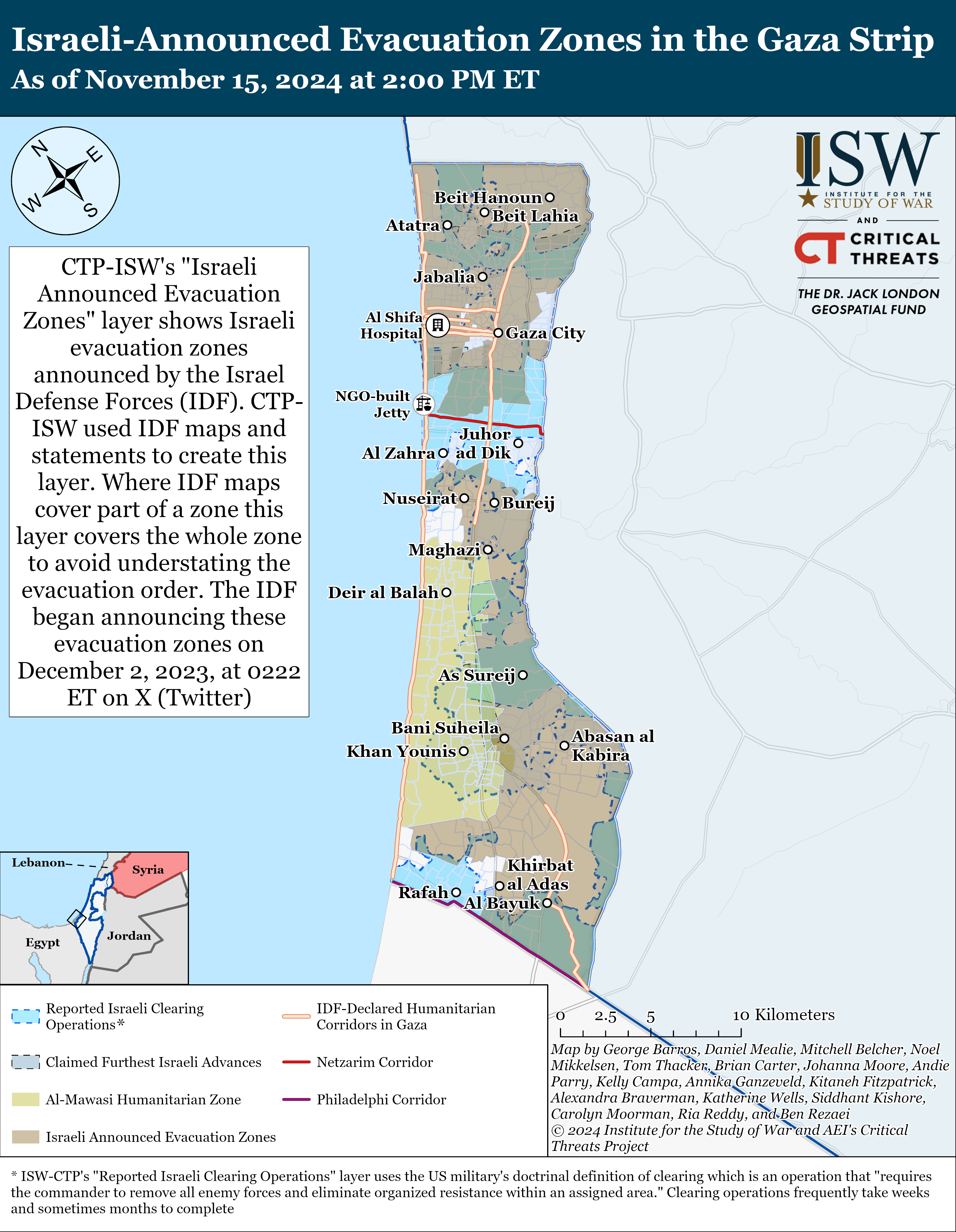
PIJ fired rockets targeting an IDF artillery position in southern Israel on November 15.[lii]
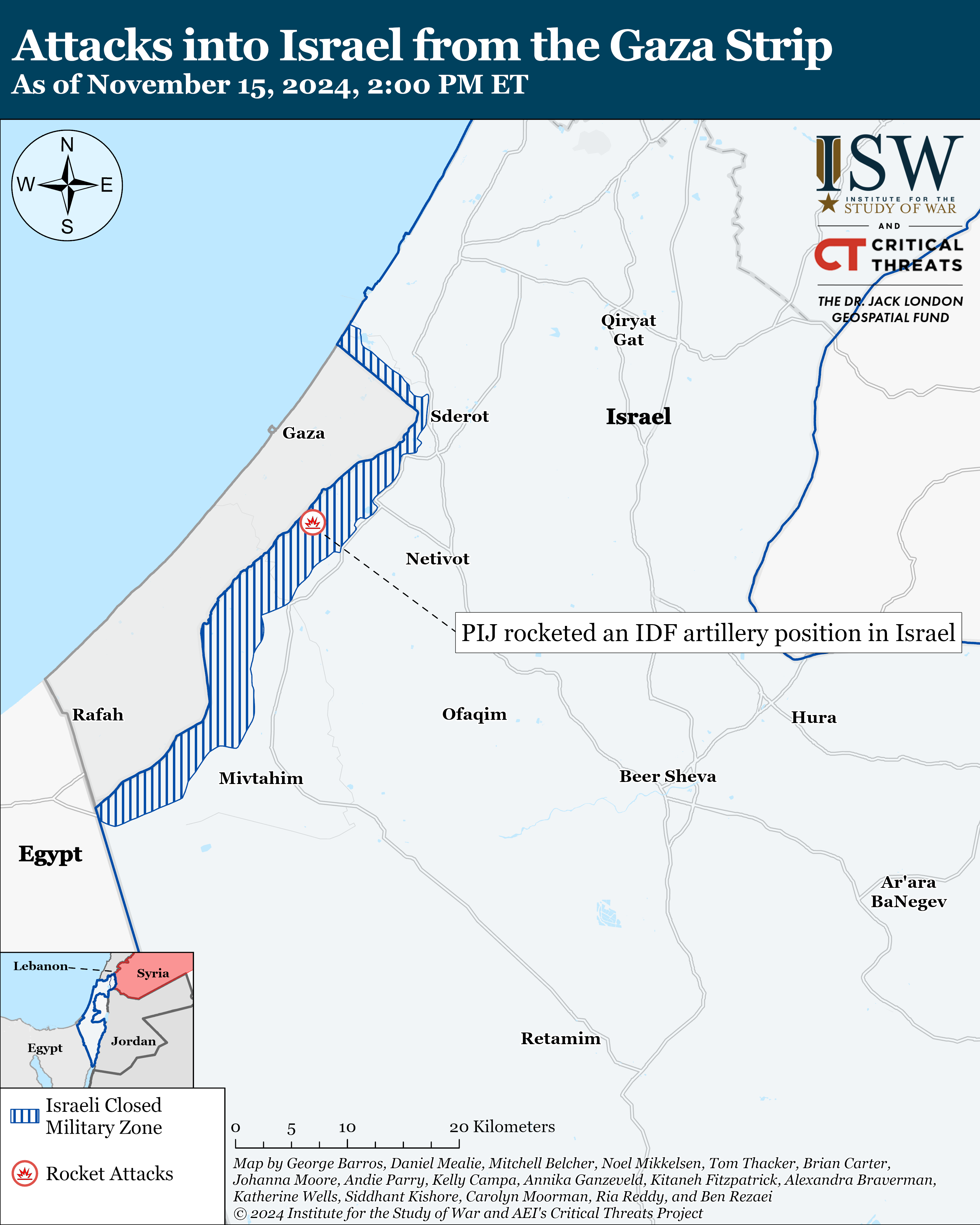
West Bank
Axis of Resistance objectives:
- Establish the West Bank as a viable front against Israel
Nothing significant to report.
Northern Israel and Lebanon
Lebanese Hezbollah objectives:
- End Israeli operations in the Gaza Strip
- Survive the October 7 War as a capable political and military organization with control over Lebanon
Elements of the IDF 91st Division continued operating in southeastern Lebanon on November 15. The IDF reported that the 91st Division has located rocket launchers and short-range rockets, and various combat equipment during clearing operations.[liii] Hezbollah claimed seven rocket attacks targeting Israeli forces operating in the eastern neighborhoods of Tallousseh.[liv] Hezbollah also claimed three rocket attacks targeting Israeli forces around Markaba, east of Tallousseh.[lv] Geolocated footage posted on November 14 showed the 89th Commando Brigade advancing west from Markaba towards Tallouseh.[lvi]
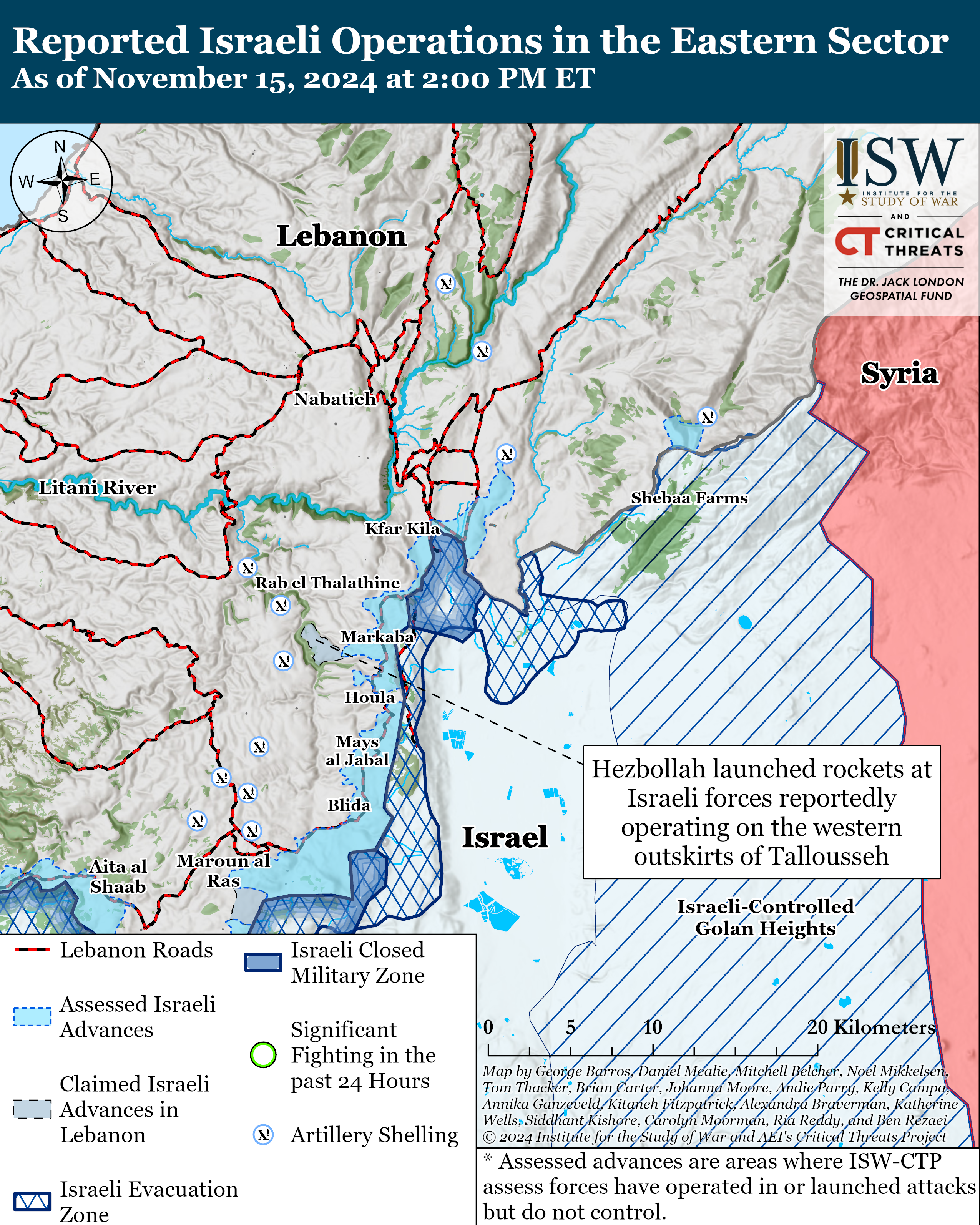
The IDF 36th Division expanded its clearing operations in southcentral Lebanon on November 15. The 36th Division destroyed underground Hezbollah infrastructure that contained rocket launch platforms, staging areas for ground operations, and various weapons.[lvii] The 36th Division directed airstrikes and engaged Hezbollah fighters as it advanced.[lviii] Hezbollah has continued indirect fire attacks targeting Israeli forces attempting to advance from Maroun al Ras into “second line” Lebanese border towns.[lix]
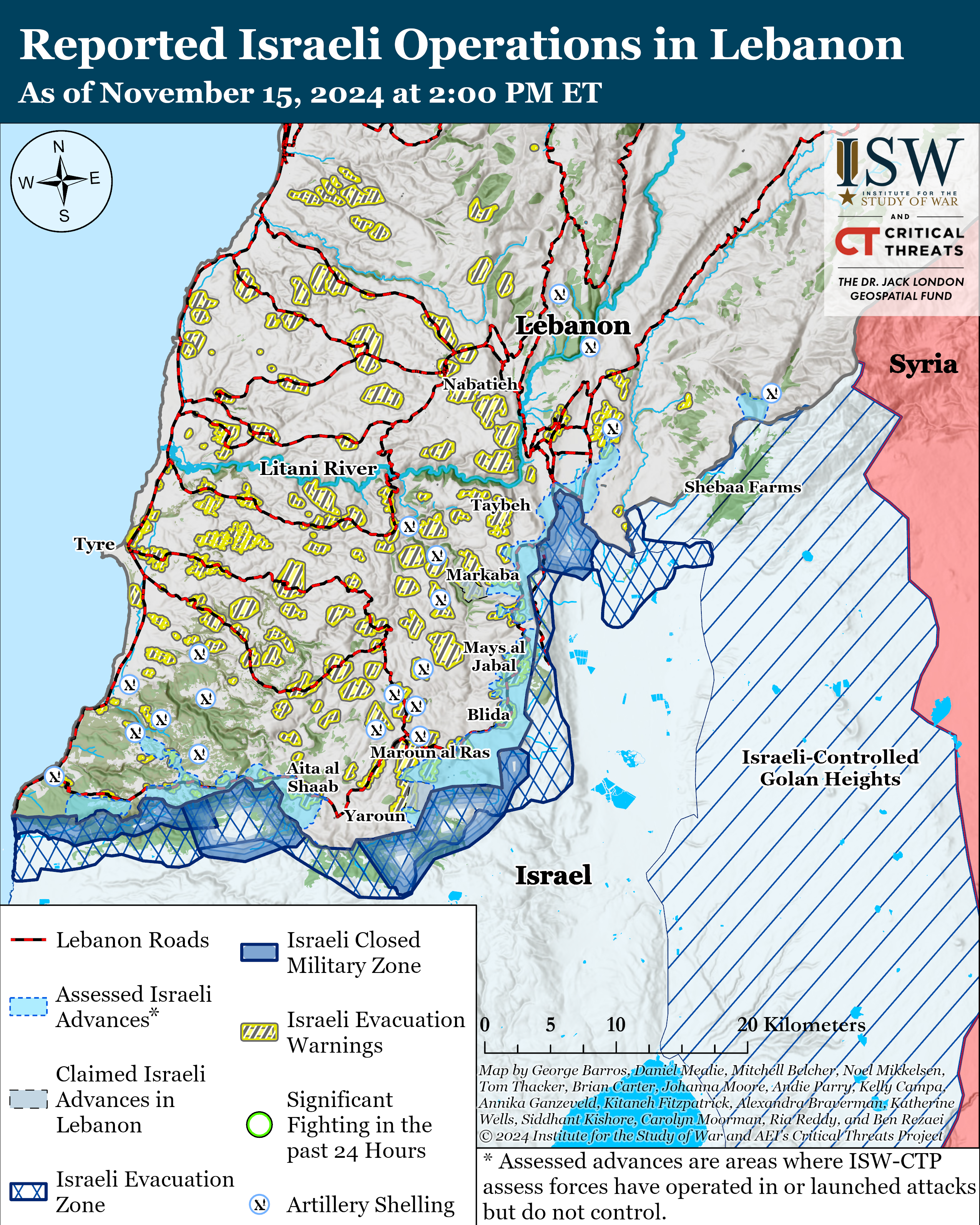
The IDF continued its air campaign targeting Hezbollah weapons manufacturing and storage sites in Beirut on November 15.[lx] The IDF conducted at least three separate waves of airstrikes targeting Hezbollah munitions warehouses, headquarters, and other infrastructure.[lxi] The IDF Arabic-language spokesperson issued warnings to residents of Ghobeiry, Burj al Barajneh, Hadath, and Haret Hreik, before striking these areas.[lxii]
The IDF struck a Hezbollah Radwan special operations force headquarters in Nabatieh on November 15.[lxiii] The IDF also struck a building used by Hezbollah’s Badr Unit to conduct attacks against Israel and Israeli forces.[lxiv] The Badr Unit is responsible for Hezbollah’s defense north of the Litani River.
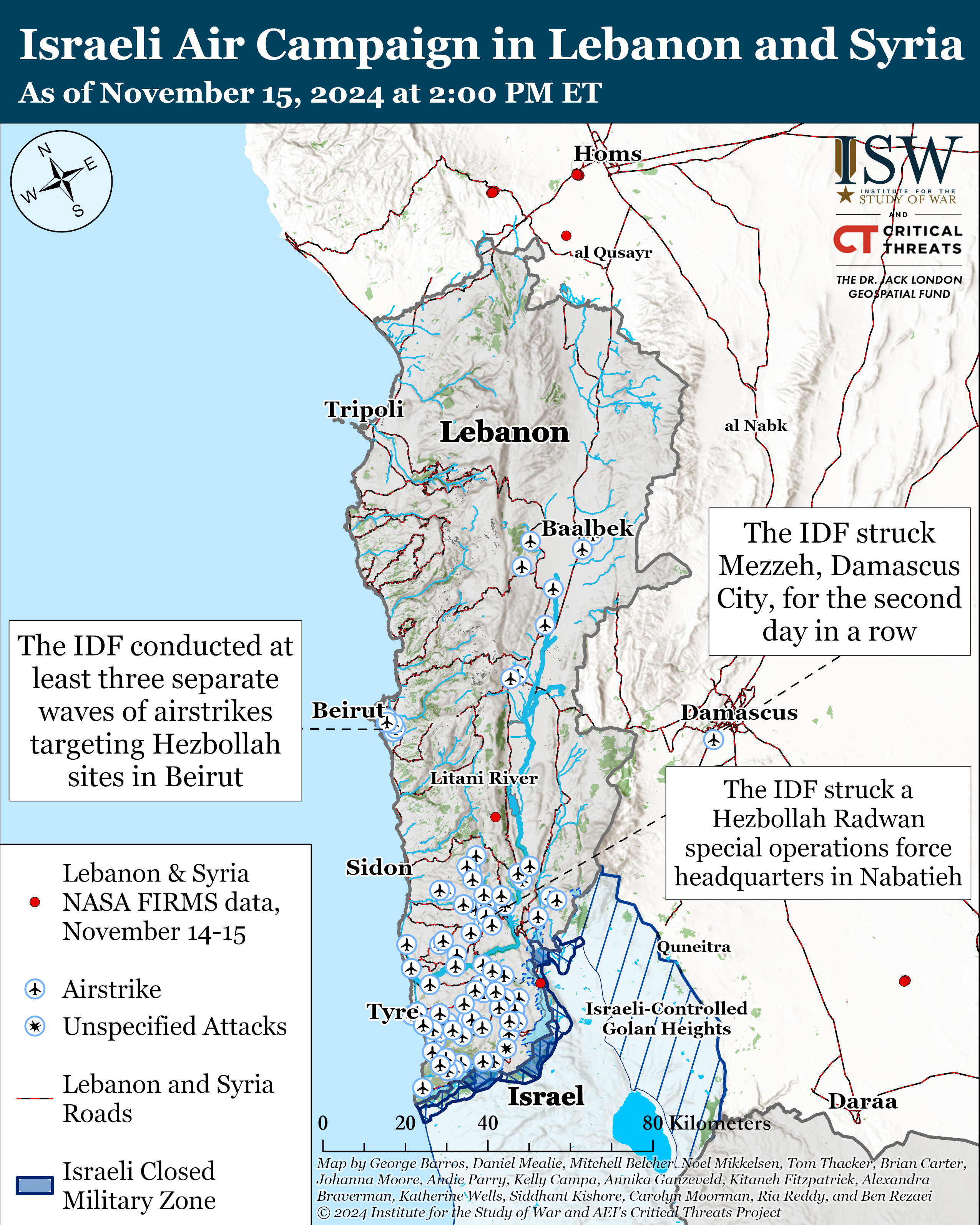
This map illustrates individual Israeli air and artillery strikes based on local Lebanese reporting. This map depicts strikes reported from 2:00pm ET on November 14 to 2:00pm ET on November 15. This map is not exhaustive. CTP-ISW cannot independently verify the locations of Israeli strikes.
Hezbollah has conducted at least 14 attacks into Israel since CTP-ISW’s last data cutoff on November 14.[lxv] 11 of the 14 Hezbollah-claimed attacks targeted Israeli personnel along the Israel-Lebanon border.[lxvi] Hezbollah conducted two attacks targeting Israeli personnel at the Dovev Barracks in northwestern Israel.[lxvii] Hezbollah fighters fired rockets at Israeli forces in Kiryat Shmona, across the border from where Israeli forces are conducting clearing operations in Markaba, southeastern Lebanon.[lxviii] Israeli Army Radio reported that there Hezbollah conducted about 40 launches from Lebanon into northern Israel on November 15.[lxix]
Hezbollah also claimed three attacks targeting IDF bases in rael.[lxx] Hezbollah launched rockets targeting the IDF Tirat Carmel base in southern Haifa.[lxxi] Hezbollah claimed it conducted an attack targeting Tel Haim, the IDF Military Intelligence Division base, near Tel Aviv.[lxxii] Tel Haim is located 120 km from the border, making this Hezbollah’s deepest attack into Israel on November 14.[lxxiii] CTP-ISW cannot confirm this attack and do not Israeli red alerts suggest that Hezbollah successfully targeted this base. CTP-ISW was similarly unable to verify another recent Hezbollah attack that Hezbollah claimed targeted the Kirya in Tel Aviv on November 13.[lxxiv] CTP-ISW assessed on November 14 that Israeli forces have likely disrupted Hezbollah’s ability to fire deep into Israel.[lxxv]
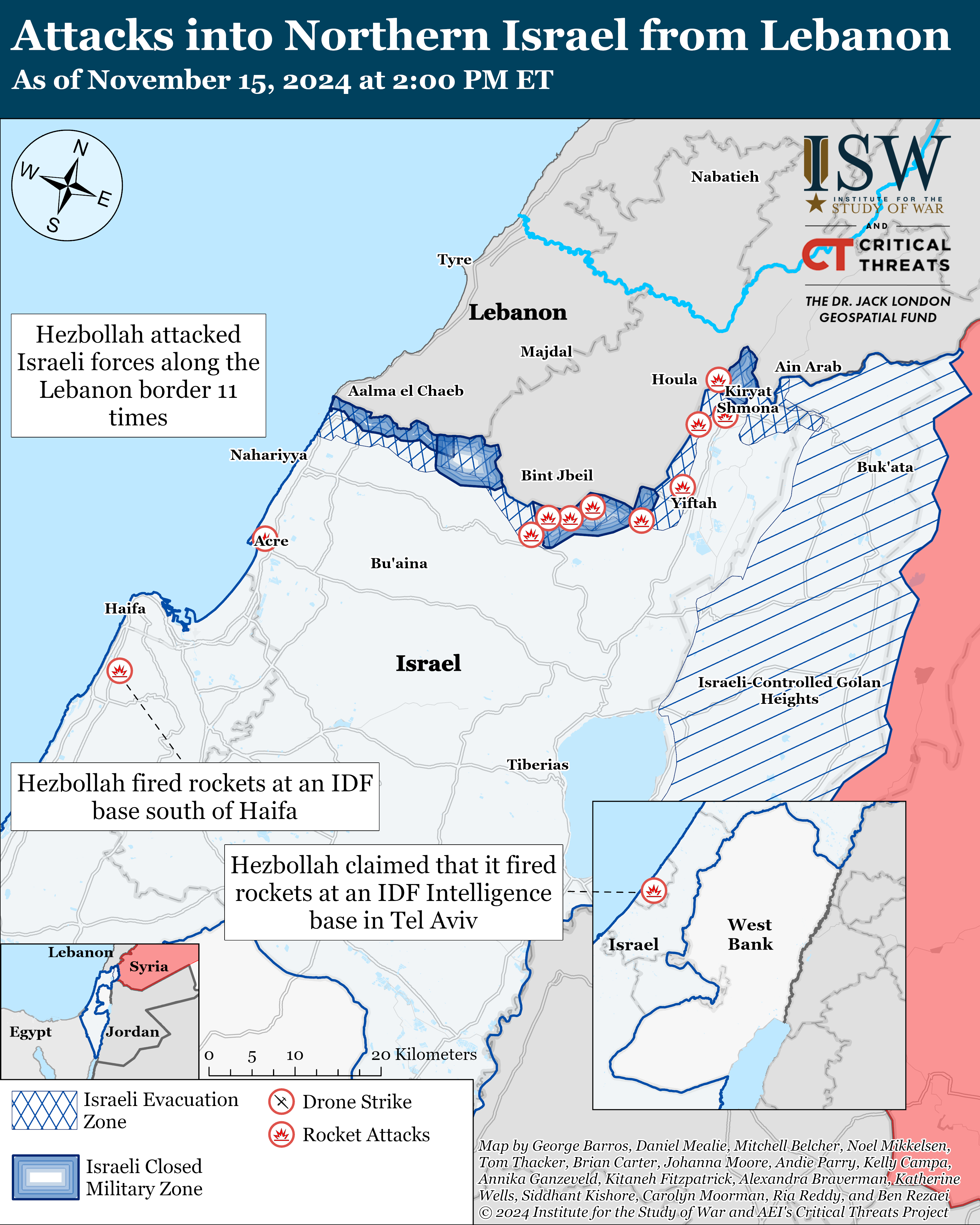
Iran and the Axis of Resistance
A US delegation sent a message to Iran expressing concern about Iranian influence in Syria, according to an unspecified informed source speaking to Iraqi media on November 15.[lxxvi] The delegation reportedly arrived in Baghdad on November 13 to hold indirect talks with Iran aimed at “calming the situation [in the Middle East].”[lxxvii] The US delegation called on Iran to prevent Iranian-backed militias in Syria from conducting attacks on Israel.[lxxviii] The delegation also noted that the presence of Islamic Revolutionary Guards Corps (IRGC) officers in Syria “will lead to more tensions and escalation.”[lxxix] This message follows a series of US and IDF airstrikes in Syria in recent days.[lxxx]
The IDF Air Force struck a military target in Damascus on November 15.[lxxxi] Local sources reported that the strike targeted a military security detachment responsible for the Mezzeh area.[lxxxii] No casualties or significant material damage were reported.
The Iran Update provides insights into Iranian and Iranian-sponsored activities abroad that undermine regional stability and threaten US forces and interests. It also covers events and trends that affect the stability and decision-making of the Iranian regime. The Critical Threats Project (CTP) at the American Enterprise Institute and the Institute for the Study of War (ISW) provides these updates regularly based on regional events.
CTP-ISW defines the “Axis of Resistance” as the unconventional alliance that Iran has cultivated in the Middle East since the Islamic Republic came to power in 1979. This transnational coalition is comprised of state, semi-state, and non-state actors that cooperate to secure their collective interests. Tehran considers itself to be both part of the alliance and its leader. Iran furnishes these groups with varying levels of financial, military, and political support in exchange for some degree of influence or control over their actions. Some are traditional proxies that are highly responsive to Iranian direction, while others are partners over which Iran exerts more limited influence. Members of the Axis of Resistance are united by their grand strategic objectives, which include eroding and eventually expelling American influence from the Middle East, destroying the Israeli state, or both. Pursuing these objectives and supporting the Axis of Resistance to those ends have become cornerstones of Iranian regional strategy.

View Citations
